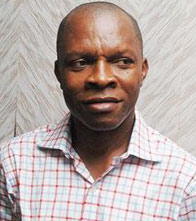A popular African proverb says that when the Agama lizard falls from a height, it nods to praise itself for the achievement.
It doesn’t wait for applause from those who may be watching from close quarters like it was done recently at the World Championships in Tokyo when Swedish pole vaulter, Arnmand Duplantis once again broke his own world record after scaling a new height of 6.30 meters (20 feet, 8 inches).
The applause from the spectators at the arena was deafening as it was his 14th world record in the sport.
Bringing this closer home, the president of the Cycling Federation of Nigeria, CFN, Engr. Giadomenico Masari and his colleagues on the Board did not have to behave like the Agama lizard in self praise.
This is because the work they have put in making cycling one of the most talked about sports in the country have not gone unnoticed by Nigerians and those saddled with the responsibility of overseeing all the sports federations especially.
While inaugurating the new board of the CFN elected last Sunday in the conference room of the National Sports Commission, NSC, the chairman, Mallam Shehu Dikko on Monday praised Engr. Masari and his team for a seamless election where there was no throwing of chairs with protests and pending appeals.
He said those who lose elections should not bring the federation down as they could still contribute to the development of the sport without being on the board.
What the NSC chairman didn’t know or didn’t want to talk about is the role those put in charge to oversee sports play in the crisis that greets federation elections in the past.
Unlike he and the Director-General, Hon. Bukola Olopade, who are not imposing candidates on the Congresses of sports federations, the immediate past men at the helm, Solomon Dalung and Sunday Dare who are politicians, never allowed federations, especially those which have their own constitution, to organize their own elections.
That was why Basketball and Athletics had turbulent elections in 2017 and 2021 which affected the sport negatively as it caused some unpleasant scenes at the last two Olympics the country attended in Tokyo and Paris.
Apart from providing an enabling environment for the elections to hold without rancour, which he praised the Cycling Federation for, Mallam Dikko reminded Masari and his team of the need to focus more on grassroot development than participation at international competitions.
He emphasized that the focus shouldn’t be on winning medals because “we are no longer competition-driven but development-driven. Don’t focus on international tournaments, place more emphasis on domestic tournaments that will produce athletes from the grassroots that would now guarantee that our participation in international competitions is sustainable and competitive at all times”.
The NSC boss passed a message to sports federations that are currently going through elections for a four-year mandate even though he was addressing the cycling group that he had already given a pass mark.
And the message was this: “Yes, we like the medals but I will be happier if you win these medals with the athletes discovered in these local tournaments and we also provide athletes that will proceed to dominate abroad.
The CFN Board which has never totally ignored national competitions took Dikko’s challenge seriously and hit the ground running a few hours after their inauguration to create 11 Commissions with which it hopes to realize the mandate set for sports in the current dispensation of President Bola Tinubu.
One of the Commissions is the Grassroot Development Commission which is aimed at taking cycling to schools, primary and secondary, where budding talents abound.
The Dikko challenge definitely will hit the football and basketball federations hardest because these two bodies believe more in using finished products based outside the country than the ones they are supposed to discover at home and groom to stardom.
The worst is the basketball federation which hasn’t had a running local league for the elite men’s clubs for quite some time now. They run an abridged league for the women, because of a dedicated sponsor which has stayed put because of their love for the sport and not because of the organisational ability of the current set of administrators.
Recently the senior women’s basketball team, the D’Tigresses won a fifth consecutive Afrobasket title which the government celebrated. Unfortunately those who have failed to harness the potential of the game at the local level are beating their chest, claiming the glory when they didn’t contribute to the success of the team. Some stakeholders have asked what is the impact of the D’Tigresses victory on the local players when the local league is almost comatose.
The administrators are already campaigning with the D’Tigresses dominance in Africa in the past five years to return to power once again. They have forgotten that their maladministration led to embarrassing moments for the country at international competitions and that players, out of patriotism, came together again to represent the country.
I think that Dikko and Olopade should begin the assessment of sports federations with basketball by asking the outgoing board what they have done locally to deserve a return to the Board.
The Musa Kida led Board should not use the success of the D’Tigresses to return to power when basketball is in coma locally.
Mallam Dikko’s challenge will only make sense if basketball stakeholders are allowed to make their choice and Kida is not imposed on them.
The post The Dikko challenge, by Patrick Omorodion appeared first on Vanguard News.

